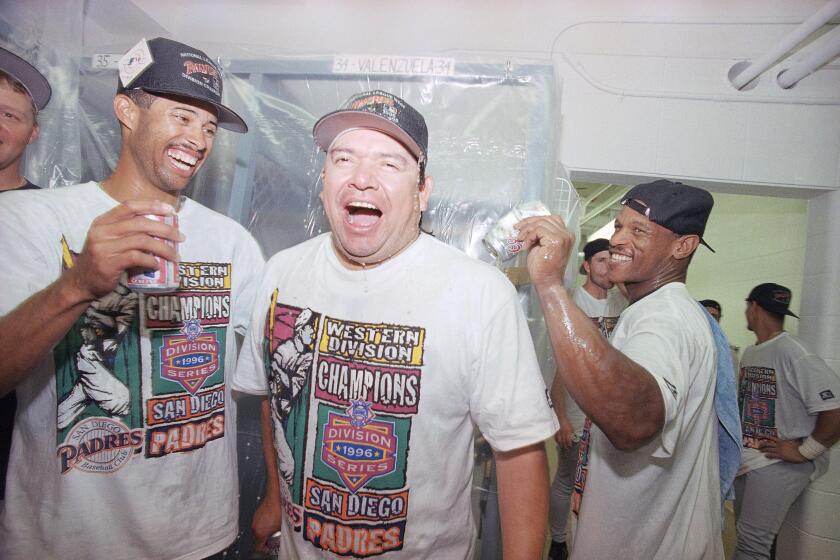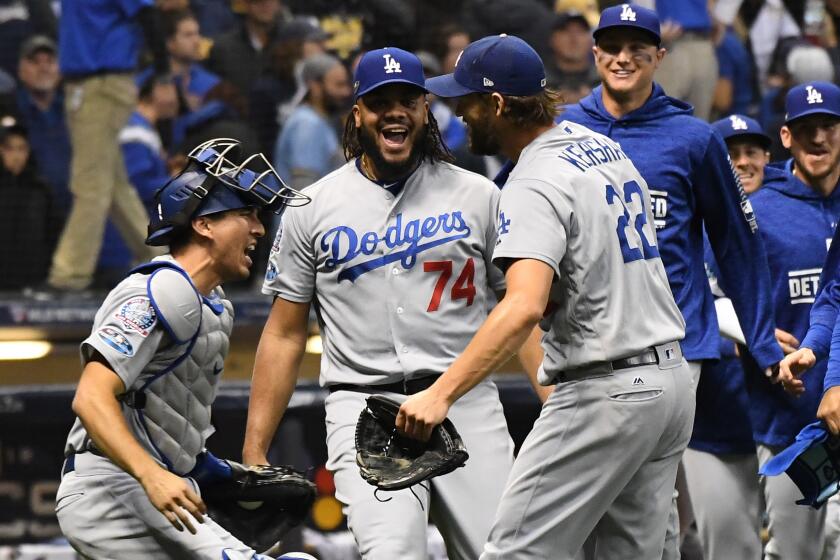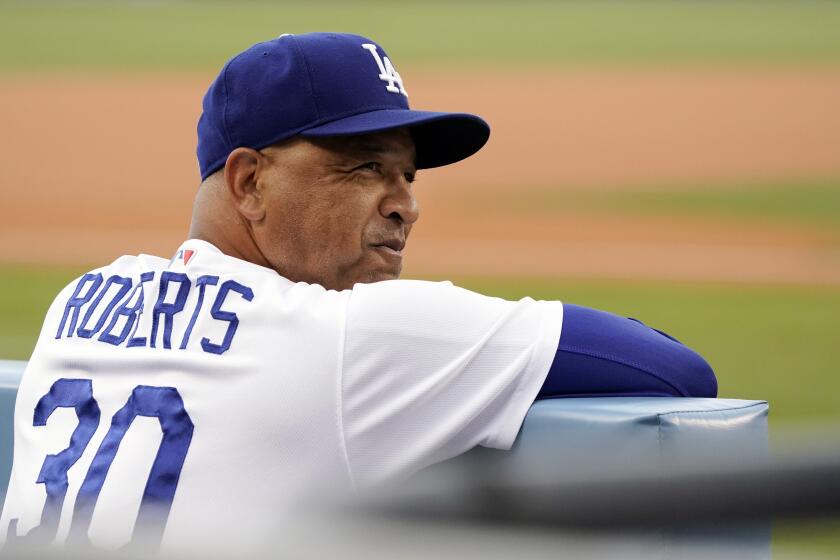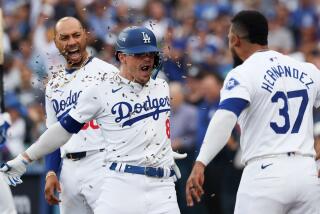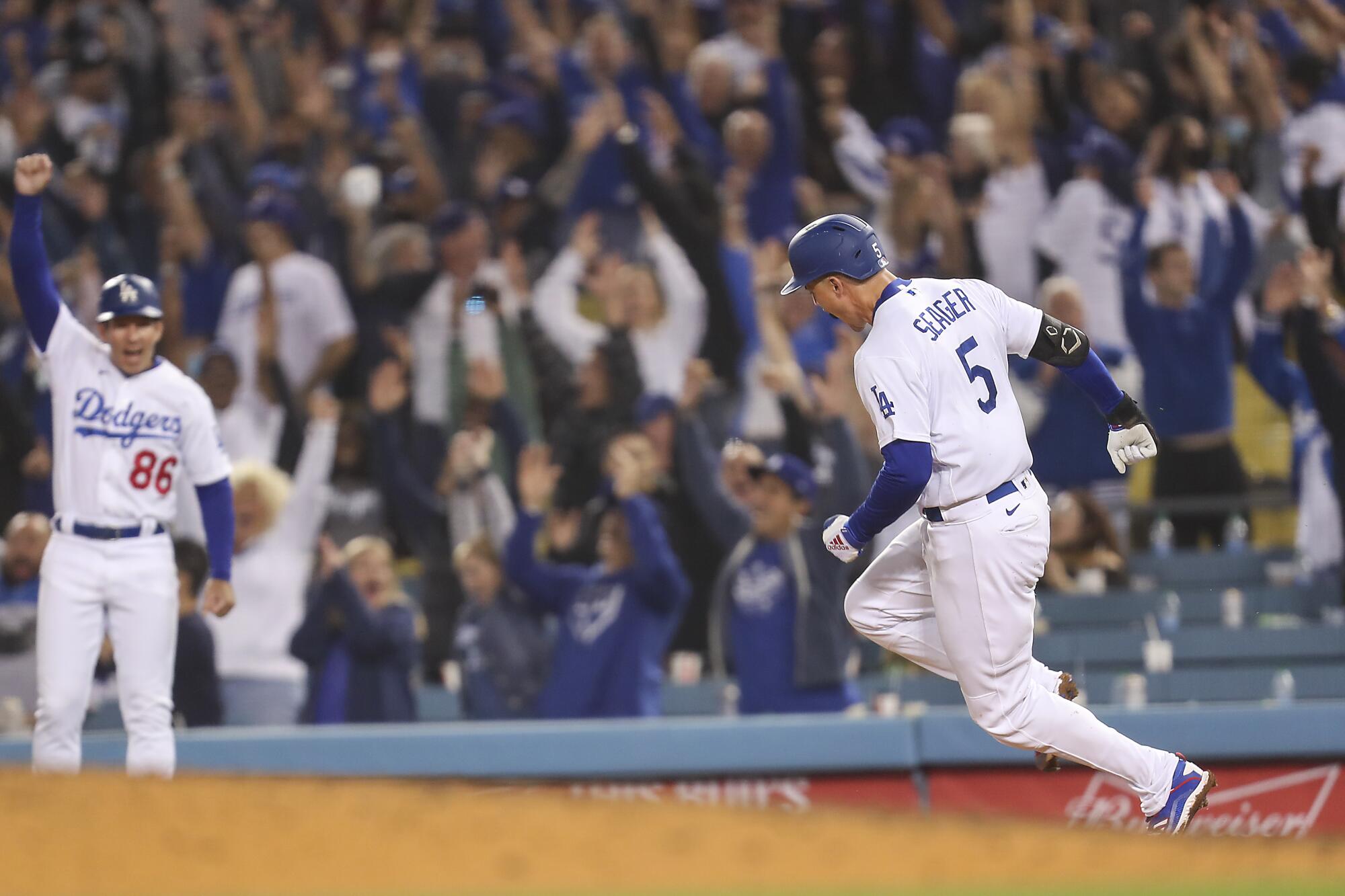
- Share via
The Dodgers begin the final series of the regular season in an unfamiliar spot: second place in the National League West. After eight straight division titles and even after reaching the 100-win mark for the third time in the last four full seasons, they have been upstaged by the San Francisco Giants. The Dodgers’ biggest rival has followed up four consecutive losing seasons with the most successful regular season in San Francisco history (105 wins through Thursday). If the Dodgers can’t overcome the Giants, they will open the postseason in the wild-card game Wednesday against the St. Louis Cardinals.
Dodgers beat writer Jorge Castillo, Angels beat writer Jack Harris and baseball writers Mike DiGiovanna and Bill Shaikin discussed the Dodgers’ season in a roundtable moderated by baseball editor Hans Tesselaar.
How should the 2021 Dodgers be viewed: As a team that won 100-plus games or a team that probably won’t win its division?
Castillo: Neither? If the Dodgers don’t end up winning the division, I think they’ll go down as possibly the best team ever to not win a division. But what really matters is what happens in the playoffs. They’ll be remembered for whatever they do in the postseason. They might be the first wild-card team to enter the playoffs as World Series favorites. But anything can happen in October — as we all know — especially in a one-game playoff.
DiGiovanna: It’s hard to consider a 103-win season a disappointment. The Dodgers weathered an assortment of injuries, navigated much of July and August with a four-man rotation, and didn’t allow the Trevor Bauer situation to become a distraction. If the Giants hold on to win the division it will be because they earned it; not because the Dodgers blew it.
After witnessing what happened in 1996 between the Dodgers and Padres, MLB wanted to make sure there was a bigger reward for winning a division title.
Shaikin: October is the answer to this question. In 2014, the Giants finished six games behind the Dodgers and won the wild card. They also won the World Series and had a parade. What fans remember is the parade, not the standings.
Harris: So much will depend on where the Dodgers go in the playoffs. Get knocked out in the wild-card game, and the story of the season will be that the team failed to catch the Giants in the division. Make another World Series run, and the fact they had to go the long way — through the wild card, and as the lower seed in subsequent rounds — only adds to the accomplishment.
If the Dodgers can survive the wild-card game, how confident should they be moving forward with a pitching staff that is one of the best, if not the best, in baseball?
Castillo: Confident enough. We dissect the team’s pitching staff every day, sometimes forgetting the context. For all the perceived flaws, the team’s staff ERA is the best in the majors by a good margin (2.99; the Giants are second at 3.27). If traditional numbers don’t do it for you, they are also tops in FIP and xFIP. Now, there are questions, starting with Kenley Jansen in the ninth inning and Clayton Kershaw’s health less than a month after coming off the injured list. I also wonder how rookies Alex Vesia and Phil Bickford will perform under pressure after heavy workloads. But the Dodgers are deep in the rotation and in the bullpen. Julio Urías
and Tony Gonsolin are expected to assume a hybrid role as they did last October to bolster the relief corps. The bigger question, I believe, is the offense.
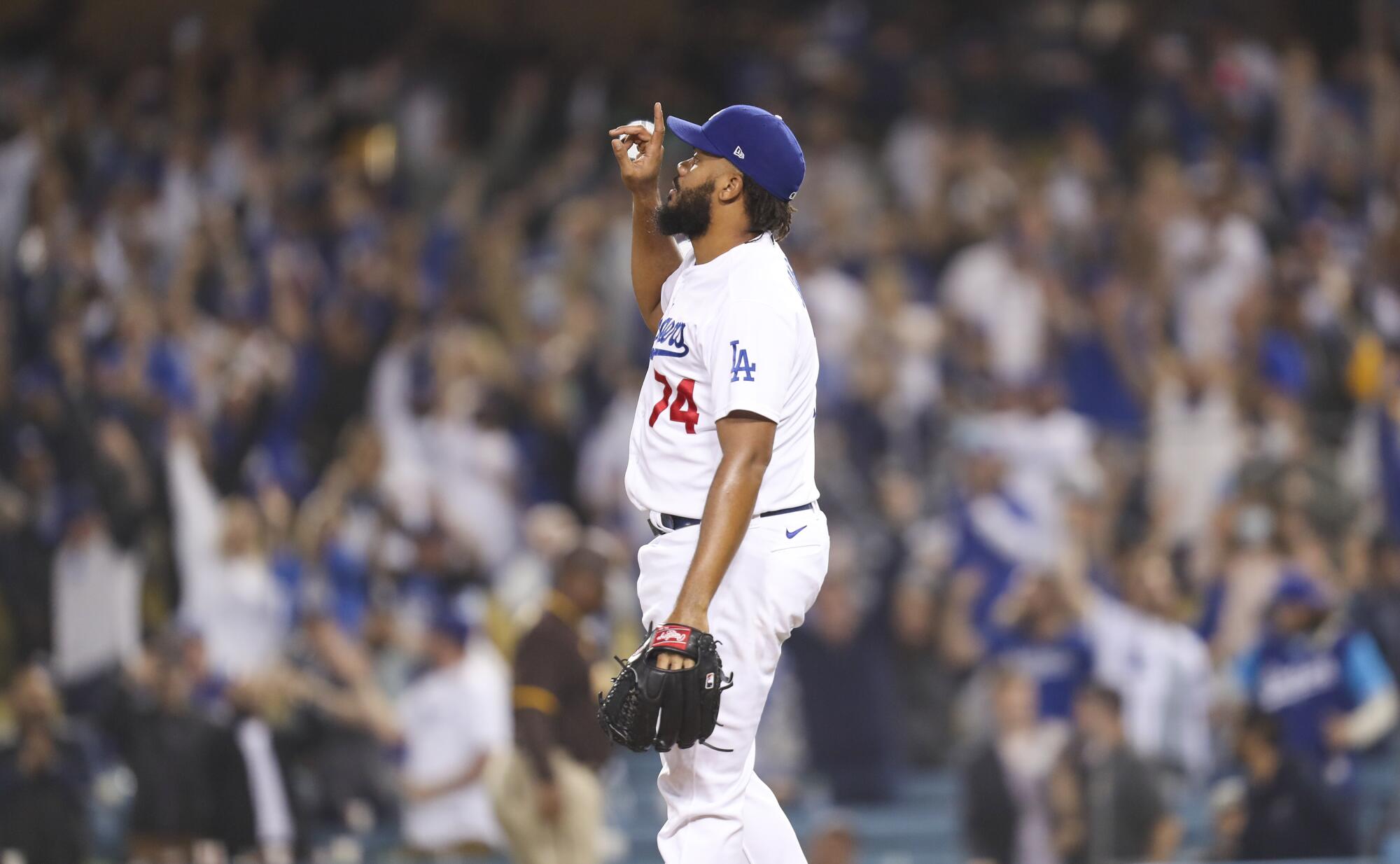
DiGiovanna: Fairly confident. A wild-card win would ease some of the pressure on the whole team, which should help in the division series, but as good as the Dodgers’ rotation is, I don’t think it will determine how far they advance in the playoffs. The depth and performance of the bullpen — can Kenley Jansen carry his second-half dominance into October? Can Blake Treinen shake off a few September hiccups? Can Joe Kelly maintain his command? Can Phil Bickford and Alex Vesia handle playoff pressure? — the defense and the ability of an offense to both slug and manufacture runs will determine how far the Dodgers go.
Shaikin: It’s easy to look at the Dodgers and say “very confident” when a Hall of Famer is their No. 4 starter. It’s a great staff, with championship experience. And, as Jorge notes, the numbers speak for themselves. But, in the playoffs, where days off are more plentiful and depth becomes less important, beware of the Brewers. Milwaukee has four starters with an ERA under 3.00: Cy Young favorite and MLB ERA leader Corbin Burnes (2.29), Brandon Woodruff (2.56), Freddy Peralta (2.81) and noted Dodgers killer Eric Lauer (2.93), whose career record against L.A. is 6-0 with a 1.89 ERA.
Harris: Obviously, their rotation has as much talent, experience and pedigree as any they’ll face in the playoffs. The bigger questions, as the others noted, probably lie the bullpen. Last October, both Kenley Jansen and Blake Treinen struggled during the World Series run. And others on this year’s team — notably Phil Bickford and Alex Vesia — have no prior playoff experience in their careers. While the group has been good during the regular season, it’s fair to wonder how they’ll handle the pressure of the postseason.
From the Shot Heard Round the World to the 2020 National League Championship Series, here’s the story of all 16 Dodgers winner-take-all postseason games.
What is the level of concern with Julio Urías’ decreased velocity, Walker Buehler’s poor September (until his last start) and Max Scherzer’s last two outings (10 earned runs)?
Castillo: It’s a lower level than a few days ago. Buehler and Urías have never pitched more in their lives but Buehler looked like himself again Tuesday after a rocky four-start stretch. He attacked more with his fastball, something he noted he thinks is important moving forward. Urías’ velocity drop isn’t ideal, but the Dodgers, as it stands, don’t need him to pitch deep into games. ... His stuff should play up in the shorter bursts. Of the three, I think Scherzer’s recent performance is the most alarming just because, barring an adjustment, he’s scheduled to start an elimination game in less than a week (unless, of course, the Dodgers catch the Giants). Yes, the first of his two rough starts was at Coors Field, where he said he had trouble getting a grip on the ball in the thin air. But he was very hittable again Wednesday. Time off should benefit him — he’d start the wild-card game on six days’ rest — and odds are he’ll figure it out.
DiGiovanna: Moderate, but not overly concerned. Urías has shown he can be effective with a little less velo, Buehler rebounded from his rough patch with a dominant start against the Padres on Tuesday night, and Scherzer’s struggles had more to do with command and pitching in Coors Field in one of those starts than stuff. Scherzer will probably benefit from a few extra days of rest before the playoffs.
Shaikin: Something to keep an eye on: Scherzer has six 200-inning seasons on his resume. But this is the first for Buehler, and both he and Urías have pitched more innings this season than ever in their careers — in the case of Urías, twice as many.
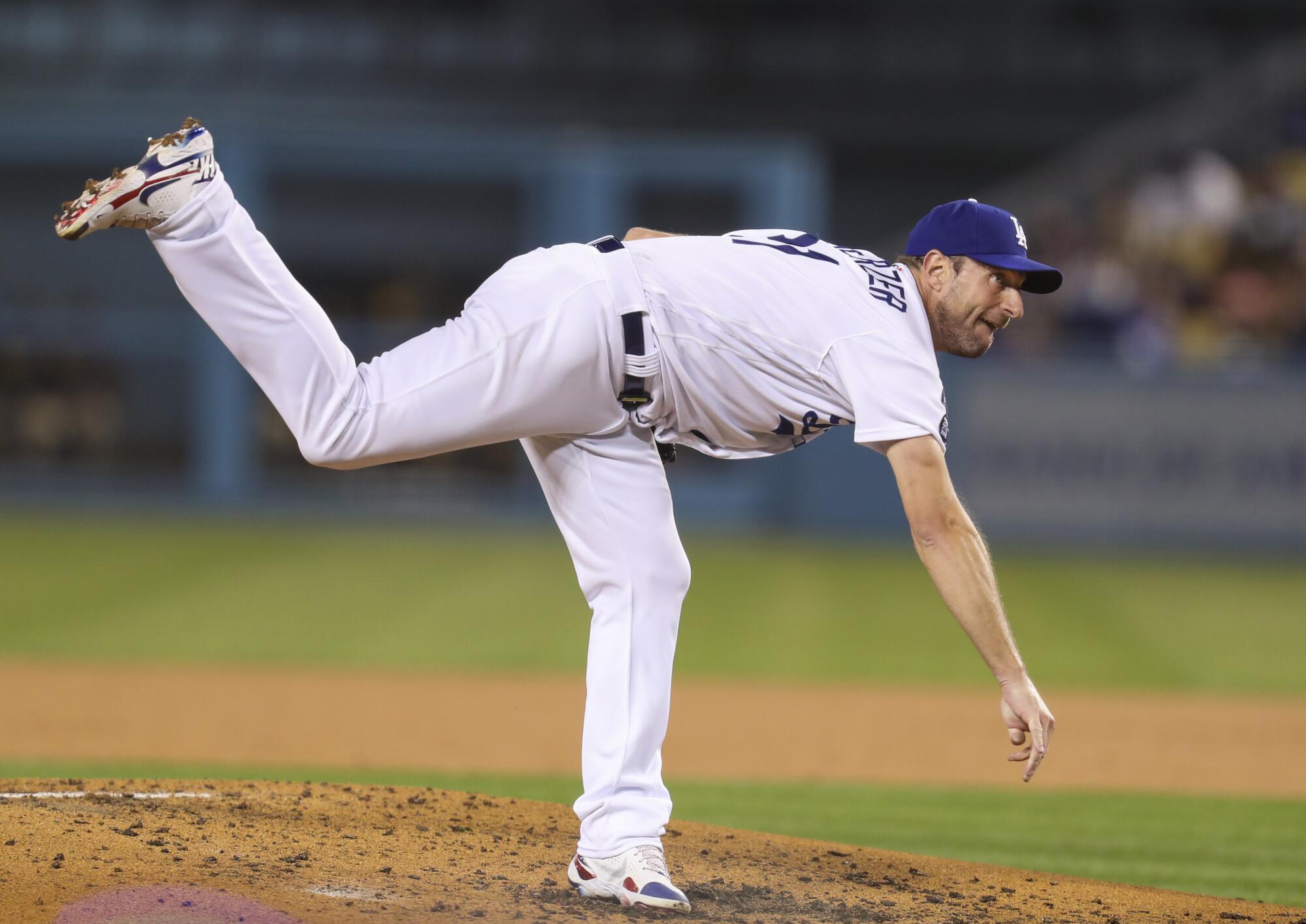
Harris: All three pitchers probably deserve some benefit of the doubt — especially given their track records in October. Buehler has made a habit of pitching his best in the playoffs. Scherzer was as hot as anyone in baseball before his last couple of outings. And Urías, even without his best velocity, has remained productive. The workload questions for Buehler and Urías are legitimate, as is Jorge’s point about Scherzer’s impending Game 163 or wild-card start. But it doesn’t seem like any of the three have risen to a panic level yet. And if the Dodgers are to make a run, they’ll likely need all three to be right.
The Dodgers lead MLB in run differential but their offense has been very inconsistent, their massive comeback Wednesday night notwithstanding. In early September, Max Muncy said the offense has “sucked” all season. How big a problem is this?
Castillo: I think, as of right now, it’s the Dodgers’ biggest problem. It’s crazy to even say that. A lineup with Muncy and Mookie Betts and Justin and Trea Turner and Corey Seager and AJ Pollock and Will Smith, etc., etc., shouldn’t have trouble producing runs. But it does too often. Now the Dodgers will have to figure out how to consistently score against elite pitching. Adam Wainwright is lined up to start for the Cardinals in the wild-card game. Remember the last time he faced the Dodgers? It wasn’t too long ago. He pitched into the ninth inning before the Dodgers finally chased him Sept. 8. The Dodgers remain elite at working counts, but to play deep into October they need to do what they did last October: rely less on the home run, string together hits and better adjust their approaches to the situation.
If the Dodgers lose the wild-card game in ugly fashion — like they did in Game 5 of the 2019 division series against the Nationals — I can see the temperature under Roberts’s seat getting considerably warmer.
— Mike DiGiovanna
DiGiovanna: It will be a big problem if the Dodgers swing for the fences too much and fail to manufacture runs. Situational hitting played a huge role in their World Series run last October, and adding Trea Turner’s speed and bat-to-ball skills to the top of an order that already features a similar player in Mookie Betts should enhance their ability to score without the long ball. Pinch-hitting specialist Albert Pujols can also be counted on to score a runner from third with fewerthan two outs.
Shaikin: We say this every October: The pitching is better in October, when more days off mean teams often can bypass their fifth starters and middle relievers, and so every run is critical. But a generation of players raised on launch angles does not suddenly develop the ability to deliver productive outs in October. If Cody Bellinger or Gavin Lux starts and Chris Taylor does not, do you know how many sacrifice bunts have been delivered this season by the entire Dodgers’ starting lineup? ZERO. Swinging for the fences is what they do; the Dodgers do not focus on small ball. That said, Trea Turner’s speed adds an urgent dimension to the offense. Most importantly, the Dodgers have to trust one another to deliver a big hit — work the count instead of swinging for the fences right away, take a walk, grind down the opposing pitcher and get into the bullpen.
Harris: Another factor to keep in mind regarding this topic: The Dodgers might not be able to rely on the same quality of depth they did last year. Remember the key contributions from Kiké Hernandez and Edwin Ríos in the NLCS, or Joc Pederson in the World Series? This year’s bench looks a little more thin — which could be trouble if the issues raised above continue into the postseason.
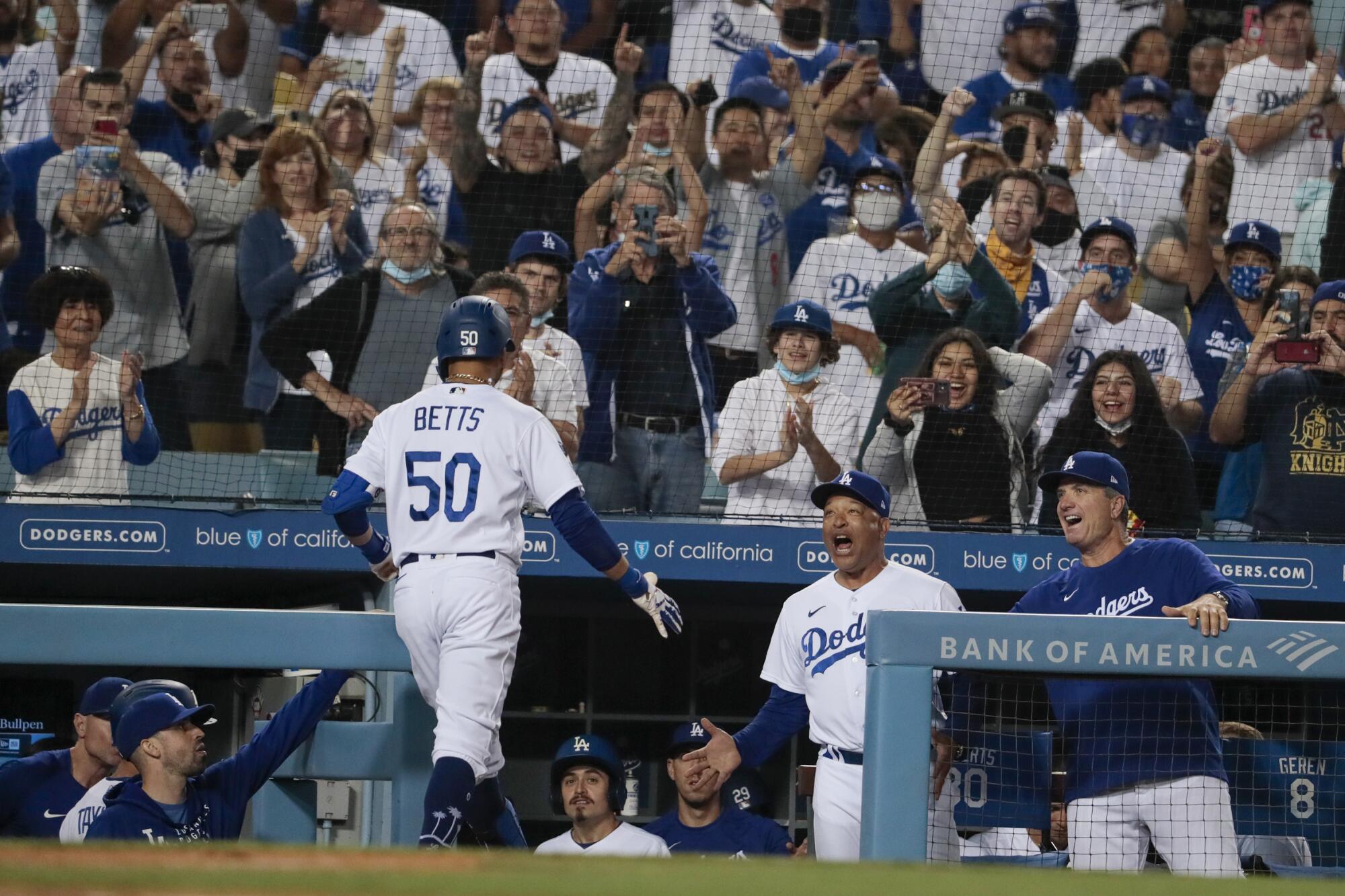
Fair or not, Dave Roberts seems to take a great deal of criticism after every loss. How much pressure is on him, or did winning the 2020 World Series take the heat off him?
Castillo: Roberts draws scorn almost every day even as he manages the second-best team in the majors, even with the highest winning percentage for a manager in major league history. So that, I’m sure, adds to the pressure for him. But if you think he’s going anywhere if the Dodgers don’t win the World Series, I don’t see that happening, no matter how ugly the ending. His contract expires after next season. Let’s talk then.
DiGiovanna: You would think a World Series championship, along with five NL West titles and three 100-win seasons, would ease that kind of pressure on a manager, but if the Dodgers lose the wild-card game in ugly fashion — like they did in Game 5 of the 2019 division series against the Nationals — I can see the temperature under Roberts’s seat getting considerably warmer.
Shaikin: I pointed out in a column recently that no one in major league history has managed more games with a higher winning percentage than Roberts. The responses were fast and furious: Look at the Dodgers’ payroll! Look at the Dodgers’ talent! OK, but it raises this question: Is overachievement the standard for managerial excellence? Based on manager-of-the-year voting most years, the answer is yes. But wouldn’t that mean Roberts gets none of the credit if the Dodgers win — they’re supposed to! — but all of the blame if they do not?
Nobody in major league history has managed more games with a better winning percentage than Dave Roberts, who again guided the Dodgers to the playoffs.
Harris: Dave Roberts is afforded less margin for error than maybe any other manager in baseball. Each year, he has some of the best rosters in the league — and therefore is always under perhaps the most pressure. It seems clear now that last year’s title only bought him so much trust from the fanbase. And if the Dodgers fall short this year, it’s easy to envision him being right back on the hot seat.
Finish this sentence: The Dodgers will finish the season as …
Castillo: not World Series champions.
DiGiovanna: a $262-million team with a hefty luxury tax coming due and no World Series title to show for it.
Harris: champions of the National League — but not the World Series.
Shaikin: still waiting for their first parade since 1988.
Are you a true-blue fan?
Get our Dodgers Dugout newsletter for insights, news and much more.
You may occasionally receive promotional content from the Los Angeles Times.
More to Read
Are you a true-blue fan?
Get our Dodgers Dugout newsletter for insights, news and much more.
You may occasionally receive promotional content from the Los Angeles Times.
